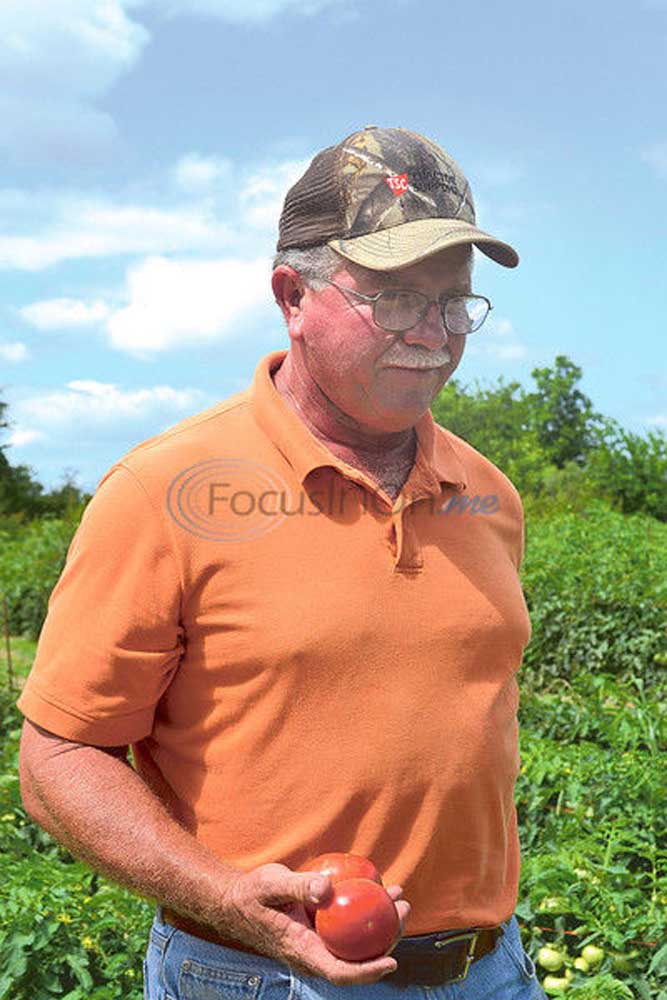Jacksonville grower Claiborne behind time-released tomatoes
Published 10:45 pm Sunday, June 8, 2014

- Faith Harper/Staff David Claiborne, owner of the Tomato Shed, is charged with making sure there are enough tomatoes for all of the contests in the Jacksonville Tomato Fest.
People will be eating, peeling smashing and stomping tomatoes as part of Jacksonville’s annual Tomato Fest celebration, but behind all of the festivities is one farmer.
David Claiborne, owner of the Tomato Shed, is charged with making sure there are enough tomatoes for all of the contests in the festival, including the eating contest in which patrons ingest them as quickly as possible; the tomato peeling contests where they use their teeth to skin the fruit, the tomato stomping contest and the tomato packing contests.
“That’s something we are proud to do,” Claiborne, 54, said. “We assumed that responsibility to make sure we have tomatoes for those events, but beyond that we need to have tomatoes for sale (at the festival) also.”
Other growers will be at the festival, as well, selling a host of local produce at the annual event.
The reputation of the famous Jacksonville tomato also will fall into his hands on Tuesday during a completion between the city and Crystal Springs, Mississippi. The two towns have a historical connection and both pride themselves on their crops. A blind taste test on the neutral grounds of Shreveport will determine which has bragging rights for the best yearly crop.
“Someone has to do it, I guess, and it just happened to land on me, so I go with it and do the best I can with it …” he said. “I’m pleased and honored to assume the mantle of carrying on the tradition of growing tomatoes in Jacksonville.”
Claiborne said it takes between 40 and 50 boxes to get through Tomato Fest. It’s not a tall order, but the timing can be difficult because the festival is timed right as the fruit begin turning red.
“We actually start discussing the climate six to eight months before Tomato Fest happens,” said Jacksonville Chamber of Commerce President Peggy Renfro. “The climate is a very important part of growing the tomatoes as well as making sure the tomatoes will be ready for the festival.”
Ms. Renfro said one year Claiborne covered the plants with dirt to protect them from a frost and then uncover them again.
He said this year, late frosts damaged a portion of his crop, but they bounced back and are full of large green tomatoes. He expects them to start turning just in time for the festival and he has an eye on a few for the upcoming contest.
Preparation for the season starts long before the plants are in the ground. Groundwork is begins in January, and seedlings are started in a greenhouse. The first plants are planted after the first frost on higher ground, where the baby plants are less likely to freeze, and planted in other patches. Claiborne tries to keep the produce going through the fall, so as plants go into the ground, others are started in the greenhouse. The seedlings are planted every 30 days, he said.
Claiborne is a third generation farmer, who remembers plowing the fields using mules in the 1960s.
“I learned from my dad how to cultivate, plant and what to do to the crops, as well as establish the work ethic that goes along with it,” he said. “You can’t be lazy and operate a farm. You have to be willing to get out there and get our hands dirty, and get up when you get knocked down, because the weather will knock you down.”
Claiborne and a few other large producers, including Guinn’s Farms, are working to take the Jacksonville tomato beyond the Tomato Fest and farmer’s markets — into super markets.
Claiborne’s tomatoes can be found in Brookshire’s and HEB stores as far north as Dallas and south as Houston. He was named Brookshire’s farmer of the year this year.
“We have really aggressively sought a home for the Jacksonville tomato, and that lead us to super markets,” he said. “That’s where the bulk of the public goes to shop.”
Ms. Renfro said the local farmers are advocates of the town.
“It’s really special to see the interest in the Metroplex in little ole Jacksonville’s tomatoes …” she said. “He’s putting Jacksonville on the map.”
Claiborne said there is just something special about eating a locally grown tomato, but he said the heritage, tradition and work that goes into the products adds to its appeal.
“Coupled with that is the taste of the tomato produced in Jacksonville,” he said. “It has a good tart flavor, and a lot of people like the tomatoes we are producing. … It’s a tradition and is the heritage we enjoy that keeps it going, and we are always looking for the ideal tomato with the greatest flavor.”






